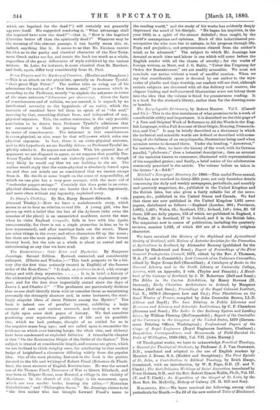The Rosicrucians : their Rites and Mysteries. By Hargrave Jennings.
Second Edition. Revised, corrected, and considerably enlarged. (Chatto and Windus.)—" This book purports to be a his- tory (for the first time seriously treated in English) of the famous order of the Rose-Cross." "It deals, or professes to deal, with strange things and with deep mysteries It is, in brief, a history of the alchemical philosophers, written with a serious explanatory pur- pose, and for the first time impartially stated since the days of James I. and Charles I." "The producers are particularly desirous that no one shall identify them with or consider them as maintaining personally the strangely abstruse and, in some instances, the start- lingly singular ideas of these Princes among the Mystics." The book is indeed one of peculiar interest, exhibiting a large amount of rare and curious research, and casting a new ray of light upon some dark pages of history. We find ourselves pondering over mysterious problems of life and its possibili- ties, which we had, perhaps, thought of as settled for us in the negative sense long ago ; and are called upon to reconsider the evidence on which ever-burning lamps, the elixir vitae, and alchemy have been condemned as exploded fallacies. A remarkable chapter is that " On the Rosicrucian Origin of the Order of the Garter." This subject is treated at considerable length, and reasons are given, which we are inclined to think weighty ones, for attributing to that ancient badge of knighthood a character differing widely from the popular idea. One of the most pleasing features in the book is the portion devoted to the life and writings of Robert Flood (Robertus de Flucti- bus), the most eminent of English Rosicrucians. He was the second son of Sir Thomas Flood, Treasurer of War to Queen Elizabeth, and was born at Milgate House, near Bersted, a village in the vicinity of Maidstone. In the church of this village is his monument, upon which are two marble books, bearing the titles,—" Misterium Cabalisticum," and " Philosophia Sacra." Mr. Jennings claims to be " the first author who has brought forward Flood's name to the reading world," and the study of his works has evidently deeply impressed the mind of his disciple. " He began his inquiries, in the year 1850, in a spirit of the utmost disbelief ; thus taught, by the world's assumptions and opinions. Much of this indoctrinated pre- occupation the wise man has to unlearn, in his progress through life.
Fogs, and prejudices, and prepossessions cleared from the author's mind, as he advanced." The subject to which Mr. Jennings has devoted so much time and labour is one which will come before the English reader with all the charm of novelty ; for the works of foreign writers, as Murr, and J. G. Buhle, " Ueber den Ursprnng der Orden der Rosenkreuzer," are not readily accessible. We must not conclude our notice without a word of needful caution. When we say that considerable space is devoted by our author to the mys- teries of phallic and linga worship, our readers will see that, although certain subjects are discussed with all due delicacy and reserve, the elegant binding and well-executed illustrations must not betray them into the idea that the volume is fitted for promiscuous reading. It is a book for the student's library, rather than for the drawing-room or boudoir.


































 Previous page
Previous page